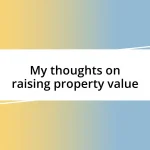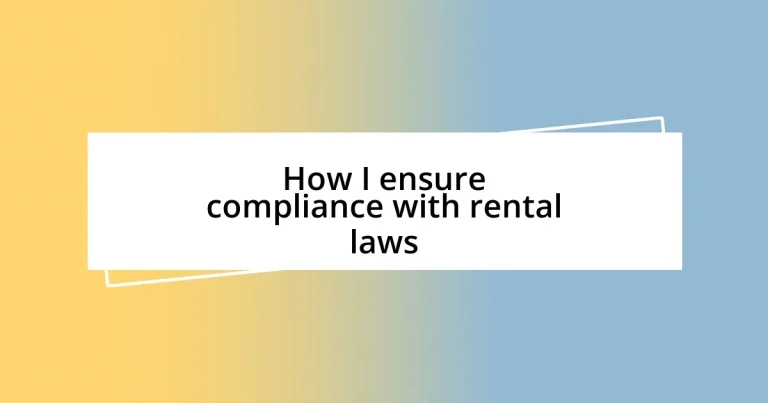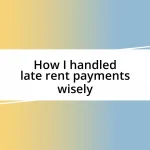Key takeaways:
- Understanding rental laws is crucial for fostering positive landlord-tenant relationships and preventing conflicts.
- Implementing clear lease agreements with all essential elements and compliance to local laws minimizes misunderstandings.
- Effective communication and documentation of interactions are essential for addressing disputes and maintaining trust between landlords and tenants.
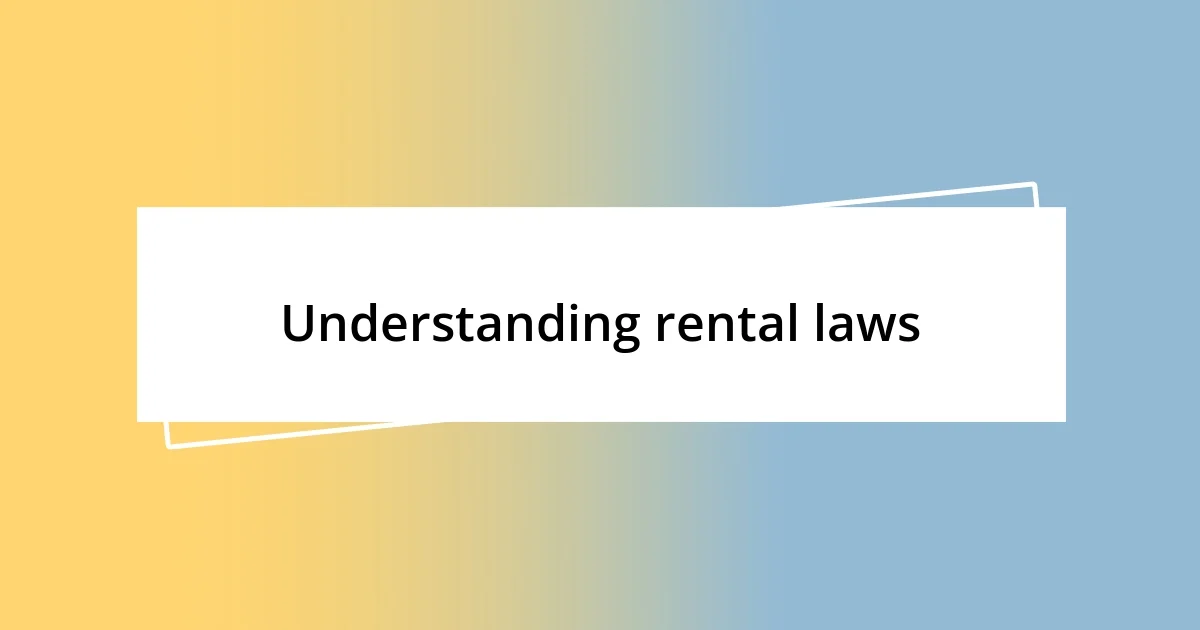
Understanding rental laws
Understanding rental laws can feel overwhelming, especially for new landlords or tenants. I remember the first time I signed a lease; I was so nervous that I didn’t even read the entire document. Have you ever rushed through something, only to realize later there were crucial details you missed? This is where understanding the small print can save you from future headaches.
As I delved deeper into rental laws, I found that they vary significantly by region. For instance, in my experience living in different states, I’ve noticed some places emphasize tenant rights more than others. Isn’t it fascinating how local regulations can shape the rental landscape? Familiarizing myself with these laws helped me create safer and more respectful living arrangements.
Moreover, understanding rental laws isn’t just about knowing the rules; it’s about ensuring a fair exchange between landlords and tenants. When I first became a landlord, I was surprised to learn that being informed isn’t just a responsibility, but also a powerful tool to resolve conflicts. How can we nurture a positive relationship with tenants if we don’t fully grasp the legal framework that surrounds us? I believe that awareness can unlock a smoother and more harmonious renting experience for everyone involved.
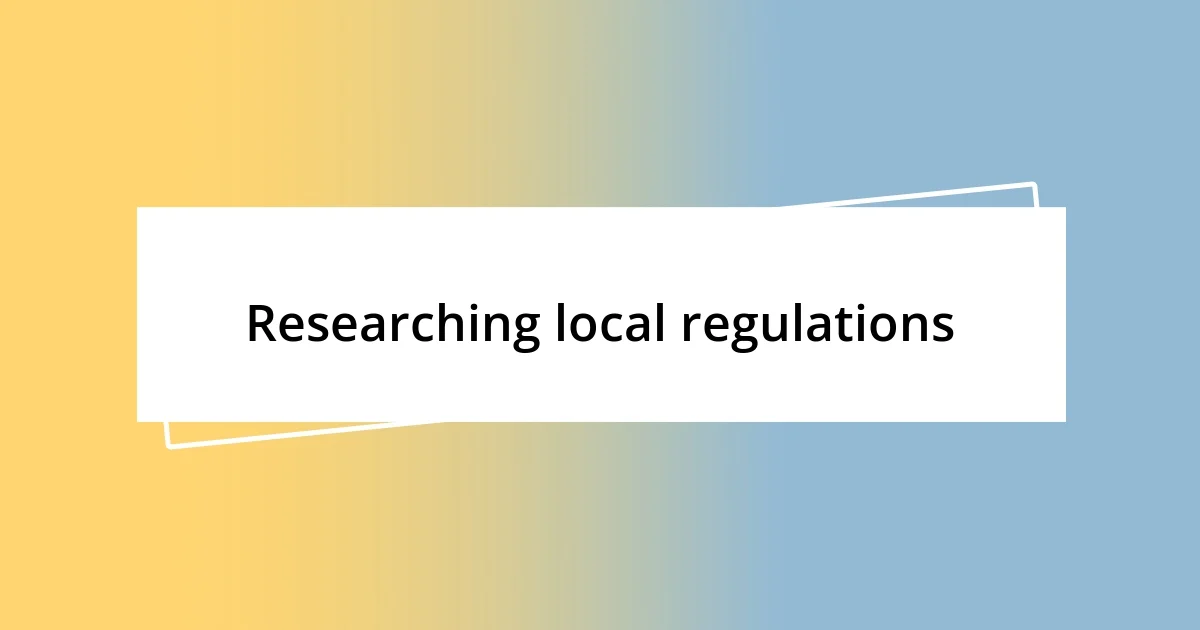
Researching local regulations
Researching local regulations is crucial for anyone involved in rental properties. I remember visiting my local housing authority to sift through a mountain of documents; it was tedious but eye-opening. Each booklet revealed nuances in zoning laws, tenant protections, and even eviction processes. The effort paid off when I confidently navigated a potential legal issue down the road.
To effectively research local rental regulations, consider these steps:
- Visit official websites: Check your city’s housing department and local government sites for accurate information.
- Join local landlord associations: Networking with other landlords provides insights that you won’t find in documents.
- Consult legal professionals: Even a brief chat with a real estate attorney can clarify complex laws.
- Attend workshops or seminars: Many organizations offer free or low-cost educational sessions on local laws.
- Stay updated: Regulations change, so subscribe to newsletters or alerts from local real estate boards.
By investing time and energy in understanding these regulations, I found that I not only protected my interests but also created a more transparent relationship with my tenants. Wouldn’t you agree that knowledge is not just power, but a necessary foundation for a positive rental experience?
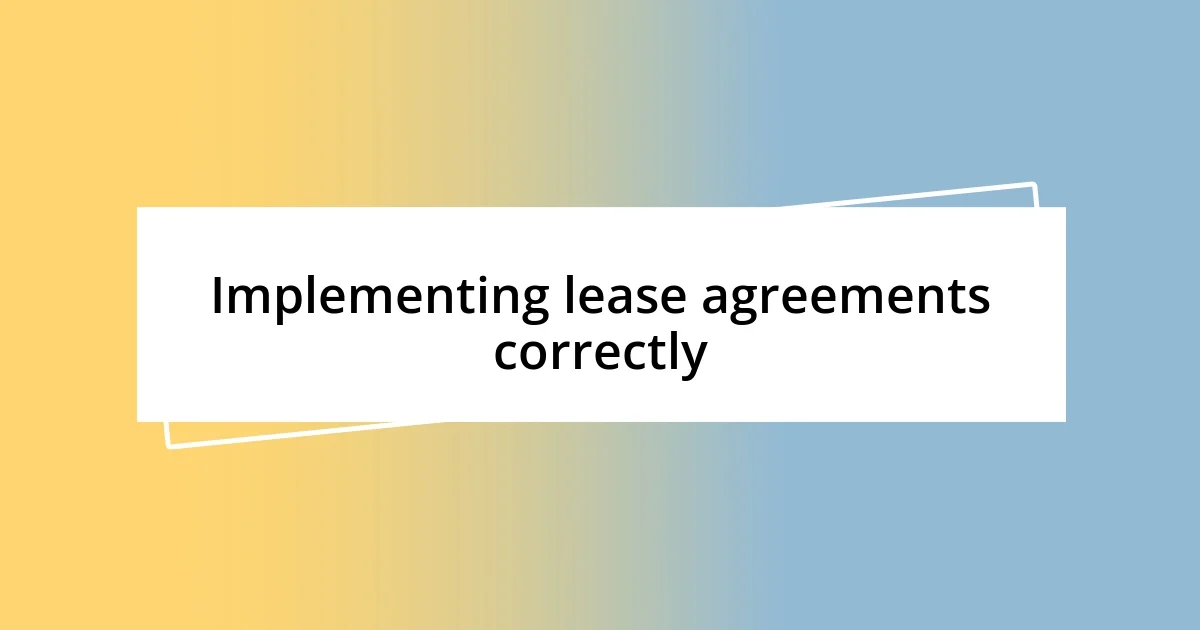
Implementing lease agreements correctly
Implementing lease agreements correctly is a vital step in ensuring that both landlords and tenants understand their rights and responsibilities. I remember the first time I drafted my lease agreement; I spent hours tweaking the language until it felt just right. It’s amazing how clear and concise terms can not only protect my interests but also foster trust with my tenants. What I’ve learned is that ambiguity in a lease can lead to disputes down the line—something I wanted to avoid at all costs.
One important aspect of a lease agreement is making sure it includes essential elements like rental amount, payment due dates, and maintenance obligations. I once had a tenant confused about their maintenance responsibilities simply because we hadn’t clearly defined them in the lease. By clearly outlining these aspects in the agreement, I found it easier to manage expectations and create a more harmonious living environment. Wouldn’t you say that clarity leads to smoother interactions?
Lastly, it’s crucial to keep the lease agreement compliant with local laws, which can sometimes change. I remember a time when I had to amend my lease after new tenant protection laws were enacted in my area. Making those adjustments was initially a hassle, but I soon realized that doing so helped prevent potential legal issues. Staying informed and maintaining flexibility in your lease agreements can strengthen the landlord-tenant relationship, reducing the likelihood of misunderstandings.
| Essential Lease Elements | Importance |
|---|---|
| Rental amount | Prevents disagreements over payment |
| Payment due dates | Helps in budgeting for both parties |
| Maintenance obligations | Clarifies responsibilities and reduces conflict |
| Local law compliance | Protects against legal issues |
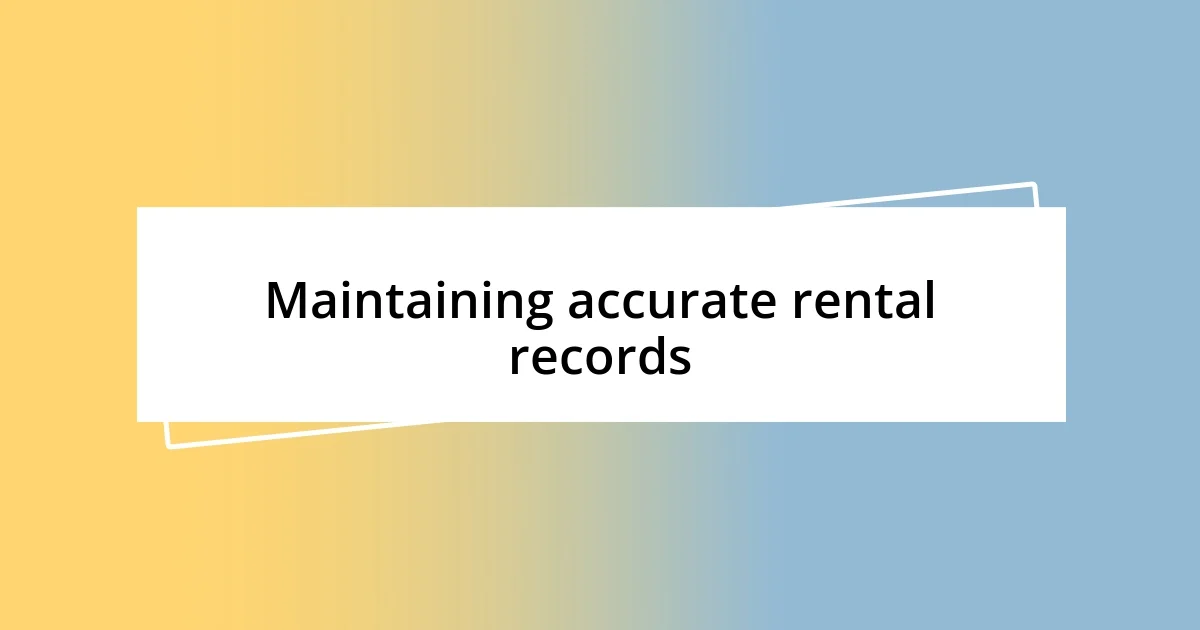
Maintaining accurate rental records
Maintaining accurate rental records is something I consider non-negotiable in my property management practice. I keep meticulous records of every tenant’s application, lease agreement, payment histories, and communication exchanges. Reflecting on my experience, I can’t help but think how having everything organized at my fingertips has saved me from stressful situations, especially during tax season.
I recall a time when a tenant disputed a late payment, and I was able to quickly pull up our email correspondence and payment receipts to clarify the misunderstanding. It felt reassuring to have solid evidence backing my claims. This experience taught me that when I document everything meticulously, I not only protect my interests but also demonstrate transparency, which cultivates trust between me and my tenants. Wouldn’t you agree that having a clear paper trail creates peace of mind?
Moreover, I’ve made it a habit to regularly update my records and back them up digitally. In our digital age, losing important documents can happen in the blink of an eye! I remember panic setting in when my old laptop crashed, taking with it years of valuable rental records. Fortunately, I had started using cloud storage shortly before; it saved the day. This taught me the importance of adapting to technology. After all, maintaining accurate records is not just about compliance; it’s about building a reliable structure within which both landlords and tenants can thrive.
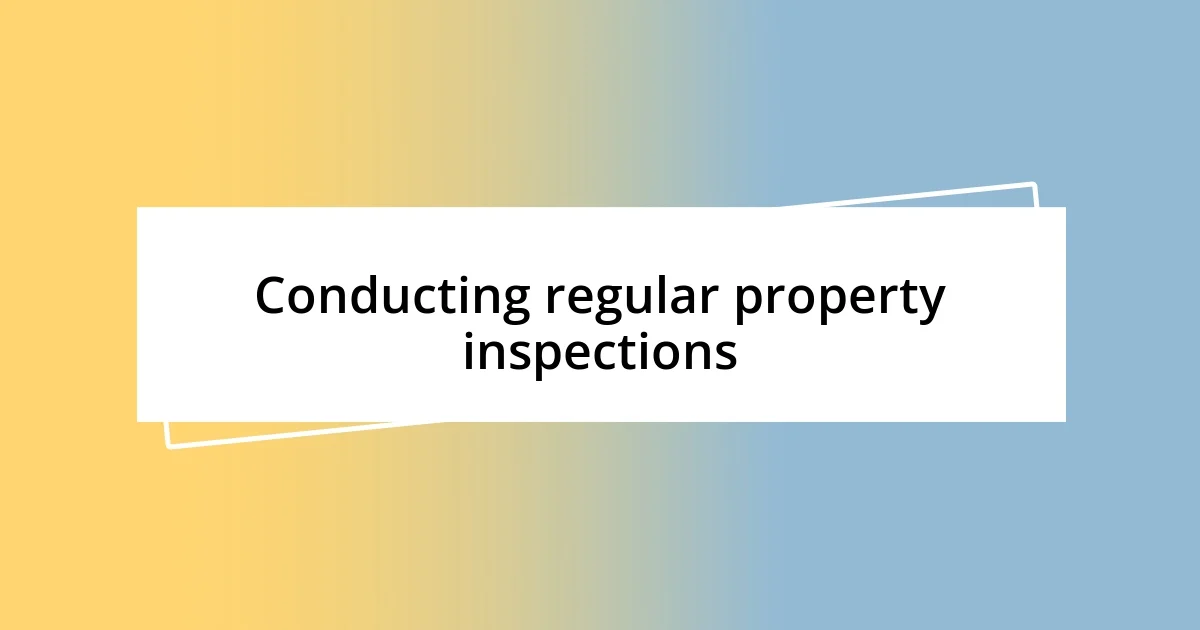
Conducting regular property inspections
Conducting regular property inspections is an essential practice that I integrate into my management routine. When I perform these inspections, it’s more than just a quick walkthrough; I see it as an opportunity to build rapport. I remember a time when I found a minor leak during one of my inspections. It might have seemed like a small issue, but addressing it early not only prevented extensive water damage but also showed my tenants that I genuinely care about their living environment. Have you ever considered how proactive maintenance can lead to a more satisfied tenant?
Additionally, I think of property inspections as a chance to gauge the overall condition of my investments. During one inspection, I discovered that a tenant had significantly modified their unit without my permission. This situation could have escalated, but because I was regularly checking in, I could address the issue quickly and amicably. Maintaining open communication during such visits helps to ensure that both parties are aware of boundaries and expectations. It’s like having a steady pulse on my properties; wouldn’t you agree that being hands-on can truly make a difference?
I also find that documenting my inspections not only keeps me accountable but protects my interests as well. After one inspection, I noted minor wear and tear that I could address in the next maintenance cycle. Reflecting on experiences like this has shown me how crucial these records are when evaluating a tenant’s security deposit upon move-out. Having clear documentation can make discussions more straightforward and less contentious. I’ve learned that a little diligence in inspections goes a long way in fostering a positive landlord-tenant relationship. What strategies do you employ in your property management journey?
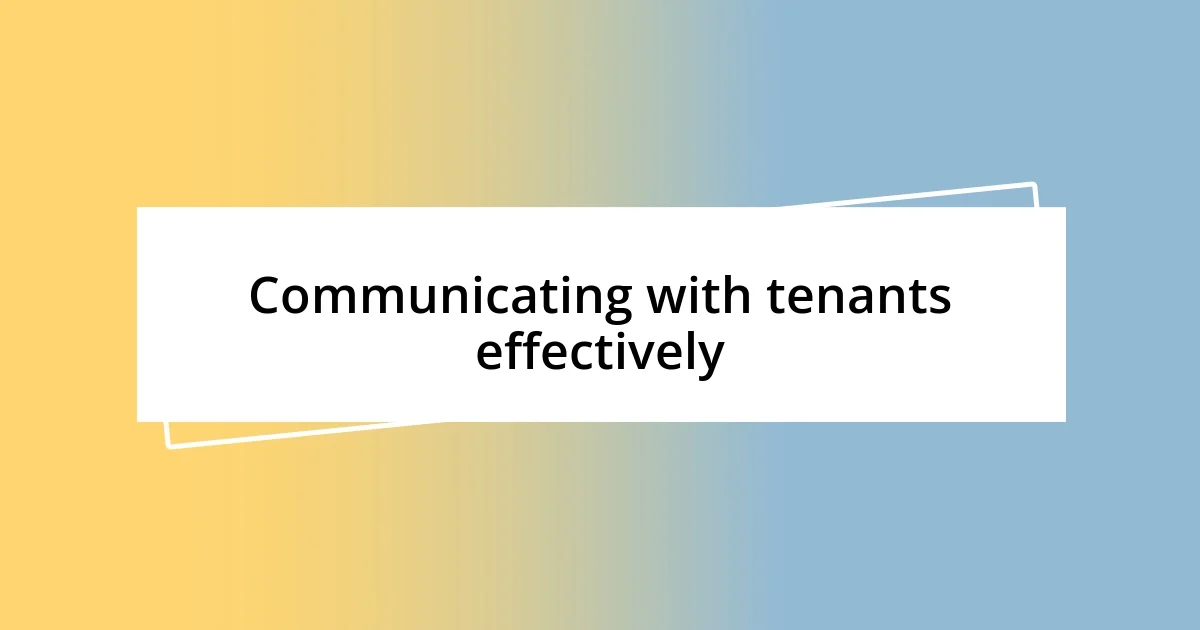
Communicating with tenants effectively
Effective communication with tenants is vital in my property management approach. I’ve learned over time that simply responding to queries isn’t enough; I strive to proactively engage with them. For instance, when a tenant reached out with concerns about noise issues from neighboring units, I didn’t just acknowledge their concern. Instead, I organized a community meeting to address noise levels directly with all affected parties. This not only resolved the issue but fostered a sense of community within the building. Have you considered how a collaborative approach can benefit tenant relationships?
I also make it a point to check in with my tenants regularly, even when there’s no apparent issue. A casual phone call or text message can go a long way in building rapport. I remember reaching out to a tenant during the winter months to see how they were coping with the colder weather. This small act of kindness opened the door for them to mention a heating issue that had gone unreported. It made me feel good to know I was creating an environment where they felt comfortable sharing concerns. How often do we forget that a simple gesture can strengthen connections?
Additionally, I prioritize clarity in all my communications. I find that using straightforward language helps prevent misunderstandings. For example, when introducing new policies or changes, I ensure to follow up with a detailed email summarizing key points. I once sent out a new pet policy and attached an easy-to-read FAQ sheet. The positive feedback I received from tenants about this clear approach reinforced my belief that transparency is essential. Have you ever experienced a situation where a lack of clarity led to confusion? It’s moments like these that remind me of the importance of direct and open communication with tenants.
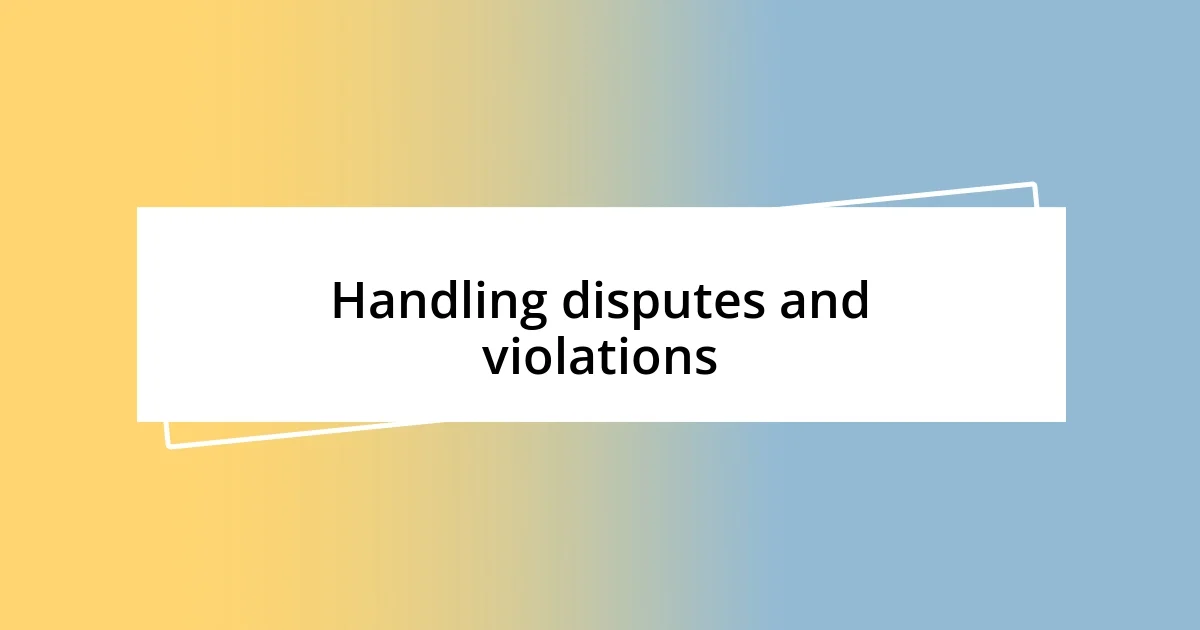
Handling disputes and violations
Handling disputes over rental agreements or property issues can be quite challenging, but I’ve developed a strategy that prioritizes open dialogue. I recall a situation where two tenants had a disagreement over parking spaces, which could have escalated. Instead of ignoring it, I brought them into a discussion where we could examine the lease terms together. This not only resolved the situation, but it fostered mutual respect—don’t you think it’s vital to encourage transparency in such situations?
When violations occur, I find it essential to maintain professionalism while being empathetic. There was an instance when I discovered a flatmate was keeping a pet against the lease agreement. Instead of jumping straight to penalties, I decided to have a candid conversation. We discussed their reasons and worked on a solution, such as a pet deposit moving forward. By approaching the situation with understanding, I found that compliance increased because tenants are more likely to cooperate when they feel heard, don’t you agree?
Documentation is a crucial tool in managing disputes and violations. I always keep a record of communications and any agreements made. I remember needing to address an ongoing noise complaint; having documented our previous discussions allowed me to present a clear timeline of the issue. This not only clarified expectations but also provided a framework for lawful action if needed. Have you ever noticed how keeping detailed records can ease tensions in complex conversations? It’s a lesson I’ve learned through experience, and it’s proved invaluable time and again.








